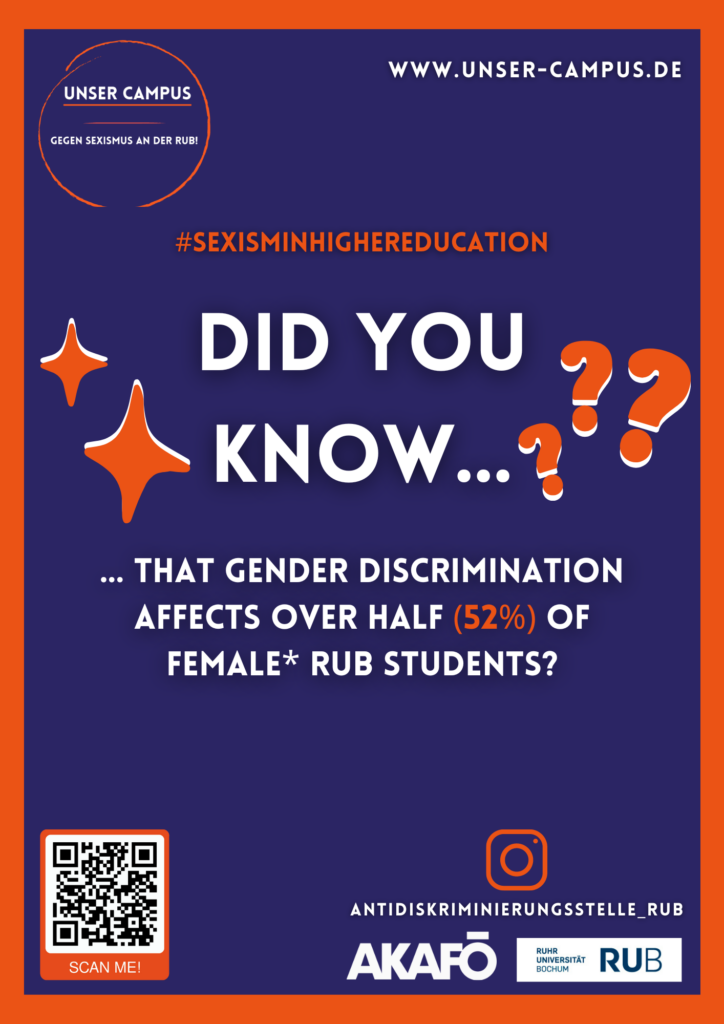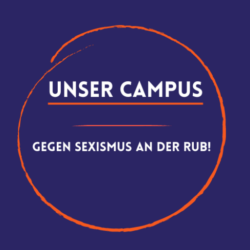The Unisafe Study of 2023 [1] uncovered that 66% of students and staff at European universities have faced gender-based discrimination at least once. The study surveyed 42,000 individuals across 46 European universities, focusing on experiences of sexism and sexual violence. Sexism, as defined by the Initiative Gegen Sexismus, is discrimination based on gender [2]. While sexism affects people of all genders, girls*, women*, and those perceived or identifying within the female spectrum, as well as queer individuals, are particularly vulnerable.

Similar trends were observed at our university. In a 2022 survey [3], a significant portion of female* (8.44%) and non-binary students (11.63%) reported gender-based discrimination, whereas male* students (3.31%) were less likely to have similar experiences.
But why are women and LGBTQIA* individuals more likely to face gender-based discrimination?
One explanation lies in societal expectations regarding the behavior of men* and women*. These stereotypes perpetuate inequality and hostility towards LGBTQIA* individuals and women*. Consequently, there are fewer female* applicants in STEM fields, contributing to Germany ranking low in female* STEM participation [4]. Biases suggesting women* have less talent in STEM perpetuate these disparities, exacerbated by a lack of female role models in the field [5].
These perceptions extend beyond individuals to university structures, contributing to what’s called „structural“ or „institutional“ sexism. For instance, there are less women* in higher positions like professorships, particularly in STEM subjects [6].
To address this, measures like quotas and equality commissions are essential. Quotas can ensure more women* occupy key positions, while equality commissions promote fair treatment during recruitment processes.
Our Campus campaign at Ruhr-University Bochum stands firmly against sexual violence. We believe that any form of sexual violence on campus is unacceptable! Through workshops, events, and online content, our project educates and raises awareness. Together, we’re creating a safer space for everyone. Check out our new campaign. (LINK)
Have you experienced sexual violence or sexism at RUB, or are you uncertain that you have? Reach out to the following support services at any time:
If you feel acutely unwell or in danger on campus, you can contact the accompanying-service (0234/3227001) or the RUB control centre (0234/32 23333) at any time.
The Anti-Discrimination Office at RUB offers confidential and impartial individual counseling sessions for all members of Ruhr-University who are affected by any form of discrimination. Feel free to contact them directly at antidiskriminierung@rub.de
If you are confronted with gender-based discrimination, then you can get in touch with the Gender Equality Office of our university or the Gender Equality counsellors in your faculty. They provide completely confidential advice. Or simply write directly to gleichstellung@rub.de.
The autonomous queer-feminist student club regularly offers events and counseling on the topic. You can also connect with other women* on campus there. Email: aqfr@rub.de Instagram: @queerfeministischesreferatrub
Are you queer? The Initiative Queer at RUB (Queer and der RUB) offers opportunities for exchange and collects all important information for queer university members. The autonomous Gay* student club is the central point of contact for Gay*-students.
In Bochum Wildwasser e.V. is a counseling center for victims of sexual violence and for prevention in Bochum. They advise and support victims, mainly women*. Rosa Strippe e.V. is the first point of contact for LGBTQIA+-community members in Bochum. Among other things, the association offers the possibility to report cases of violence directly to them online.
The Helpline „Violence against Women“ offers confidential and free help and support nationwide in Germany at the number 08000 116 016 and through online counseling, 365 days a year, around the clock, anonymously, in multiple languages, and barrier-free. Men* can also receive support and counseling at the Helpline „Violence against Men“ at the number 0800 123 9900.
Sources
[2] https://www.gemeinsam-gegen-sexismus.de/ueber-sexismus/wissen-ueber-sexismus/, aufgerufen am 04.04.2024, um 16:57 Uhr
[4] https://www.destatis.de/DE/Presse/Pressemitteilungen/2023/01/PD23_N004_213.html, aufgerufen am 04.04.2024, um 17:44 Uhr.
[5] https://professionalprograms.mit.edu/blog/leadership/the-gender-gap-in-stem/, aufgerufen am 04.04.2024, um 17:45 Uhr.
[6] Kortendiek, Beate/Mense, Lisa/Beaufays, Sandra/Bünnig, Jenny/Hendrix, Ulla/Herrmann, Jeremia/Mauer, Heike/Niegel, Jennifer (2022): Gender-Report 2022. Geschlechter(un)gerechtigkeit an nordrhein-westfälischen Hochschulen. Hochschulentwicklungen, Gleichstellungspraktiken, Ungleichheiten im Mittelbau. Studien Netzwerk Frauen- und Geschlechterforschung NRW, Nr. 39. Essen.

